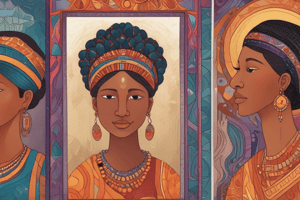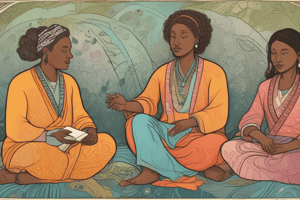Podcast
Questions and Answers
What is the primary benefit of fostering an environment with diverse cultural backgrounds in a workplace?
What is the primary benefit of fostering an environment with diverse cultural backgrounds in a workplace?
- Increased competition among coworkers
- Higher employee turnover rates
- Decreased communication barriers
- Enhanced problem-solving and creativity (correct)
Which concept refers to the ability to work effectively in culturally different situations?
Which concept refers to the ability to work effectively in culturally different situations?
- Cultural power
- Cultural competency
- Cultural intelligence (correct)
- Cultural failure
Which of the following is NOT a recommended step to develop cultural intelligence?
Which of the following is NOT a recommended step to develop cultural intelligence?
- Avoid interaction with other cultures (correct)
- Know yourself better
- Put yourself in diverse situations
- Learn to change perspectives
How does cultural competence education primarily improve communication among coworkers?
How does cultural competence education primarily improve communication among coworkers?
Which skill is crucial for demonstrating better tolerance and understanding in a culturally diverse workforce?
Which skill is crucial for demonstrating better tolerance and understanding in a culturally diverse workforce?
Which component of the cultural competence continuum focuses on being aware of one's limitations in working within diverse cultural settings?
Which component of the cultural competence continuum focuses on being aware of one's limitations in working within diverse cultural settings?
What does Cultural Failure primarily seek to achieve within the context of cultural competence?
What does Cultural Failure primarily seek to achieve within the context of cultural competence?
Which of the following best describes Cultural Skill in the context of cultural competence?
Which of the following best describes Cultural Skill in the context of cultural competence?
In the cultural competence continuum, which component indicates an inability or refusal to accept the culture of others?
In the cultural competence continuum, which component indicates an inability or refusal to accept the culture of others?
What is a significant benefit of fostering cultural competence within an organization?
What is a significant benefit of fostering cultural competence within an organization?
Flashcards
Cultural Power
Cultural Power
Trying to eliminate the cultural traits of others
Cultural Failure
Cultural Failure
Making the culture of others seem wrong
Cultural Blindness
Cultural Blindness
Unwilling to accept or understand other cultures
Cultural Competence
Cultural Competence
Viewing work as interactive, understanding different cultures
Signup and view all the flashcards
Cultural Skill
Cultural Skill
Commitment to learning about different cultures
Signup and view all the flashcards
Cultural Intelligence
Cultural Intelligence
The ability to understand and adapt to different cultural situations to work effectively with people from diverse backgrounds.
Signup and view all the flashcards
What helps develop an understanding of working styles in other cultures?
What helps develop an understanding of working styles in other cultures?
Cultural Intelligence helps you understand how people from different cultures approach work, their communication styles, and decision-making processes.
Signup and view all the flashcards
Benefits of culturally intelligent workforce
Benefits of culturally intelligent workforce
A culturally intelligent workforce fosters tolerance and understanding, leading to stronger collaboration and a more inclusive environment.
Signup and view all the flashcards
Know yourself better.
Know yourself better.
Understanding your own cultural background, biases, and assumptions is the first step to developing cultural intelligence.
Signup and view all the flashcards
Develop awareness of self in relation to others.
Develop awareness of self in relation to others.
Acknowledge and challenge any unconscious biases you may have towards other cultures.
Signup and view all the flashcardsStudy Notes
Cultural Competence Continuum
- Defined as a framework that illustrates the stages of cultural competency development.
- The continuum has six stages: Cultural Power, Cultural Failure, Cultural Blindness, Cultural Pre-competence, Cultural Competency, and Cultural Skill.
Component of Cultural Competence Continuum
- 1. Cultural Power: Seeking to eliminate vestiges of other cultures.
- 2. Cultural Failure: Seeking to make other cultures appear wrong.
- 3. Cultural Blindness: Unable or refusing to accept other cultures.
- 4. Cultural Pre-competence: Aware of what one doesn't know about working in different settings. Initial levels of awareness; hesitation, stopping, or even reversing progress is possible.
- 5. Cultural Competency: Viewing personal and organizational work as interactive, entering different settings in a way that adds to other cultures, not replaces them.
- 6. Cultural Skill: Commitment to lifelong learning to effectively serve the educational needs of diverse cultural groups, holding the vision of what can be, and committing to assessments as standards towards student success.
Cultural Intelligence
- The skill to relate and work effectively in culturally diverse situations.
- The capability to overcome cultural limitations and thrive in multiple cultures.
Importance of Cultural Intelligence
- Helps develop a thorough understanding of working styles in different cultures.
- Leads to improved tolerance, trust, and comprehension amongst colleagues.
Skills Needed to Work Effectively in Culturally Diverse Situations
- Cultural intelligence.
- Cultural competence.
- Cultural awareness.
- Cultural sensitivity.
Steps to Develop Cultural Intelligence
- Self-reflection and self-awareness.
- Increased awareness of others, different perspectives, and interaction.
- Building bridges with others, continuous learning, and practice.
Five Ways to Build Cultural Intelligence
- Cultivate curiosity and interest in learning about different cultures.
- Develop self-awareness in relation to others.
- Maintain an open mind and avoid preconceived notions.
- Acknowledge and overcome personal biases.
- Seek interaction with people from diverse cultures.
Studying That Suits You
Use AI to generate personalized quizzes and flashcards to suit your learning preferences.




